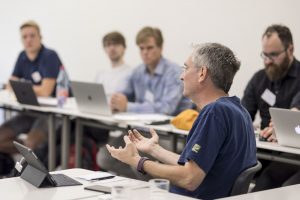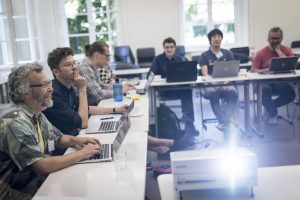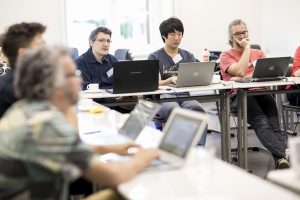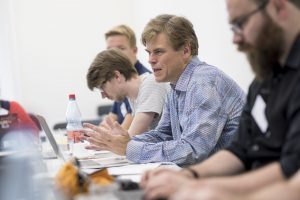
Fotograf: www.friese.tv
Andreas Friese

Fotograf: www.friese.tv
Andreas Friese

Fotograf: www.friese.tv
Andreas Friese

Fotograf: www.friese.tv
Andreas Friese

Digitale und kognitive Methoden zur Erforschung grafischer Literatur




Comics is a medium constituted of images combined with text and other visual information in order to narrate a story. Nowadays, comic books are a widespread cultural expression all over the world. The market of comics continues to grow, for example, the market in Japan is about 4.25 billion USD in 2015. Moreover, from the research point of view, comics images are attractive targets because the structure of a comics page includes various elements (such as panels, speech balloons, captions, leading characters, and so on), the drawing of which depends on the style of the author and presents a large variability. Therefore, comics image analysis is not a trivial problem and is still immature compared with other kinds of image analysis.
The scope of this workshop includes, but is not limited to:
Workshop Paper submission deadline: August 27, 2018
Camera ready papers due: October 12, 2018
Author Registration: October 12, 2018
All accepted papers will be published in the conference proceedings, as part of the Lecture Notes in Computer Science (LNCS) series by Springer. Authors of selected papers of MMM 2019 will be invited to publish extended versions in a journal special issue.
To evaluate the proposed works, participants will be able to use the following datasets that are publicly available. Researchers can request to download them at each website.
Workshop organizers:
We still have a few spaces left, so please get in touch if you’re interested in joining us!
This workshop will bring together scholars in the field of empirical comics research to define common standards and ensure interoperability between disciplines. Researchers interested in comics are increasingly discovering annotation as a necessary and highly beneficial way of digitally enriching their object of study and moving towards data-driven scholarship. For this purpose, a number of tools and data formats have been adopted in areas as diverse as literary and media studies, art history and linguistics, cognitive and computer science. While this diversity represents the outcome of different requirements and backgrounds, a lack of coordination may also make it difficult or even impossible to share data and compare results. The workshop aims to establish common frameworks for future research and answer the following questions:
• What standards do we need to define to ensure interoperability between different researchers and approaches?
• How can annotation schemes be developed and adapted for the visual aspects of artefacts such as comics?
• How can integration be achieved between text-oriented standards, such as TEI and CBML, and further non-text-oriented schemes?
• Where, and to what extent, do we need to move beyond, or in parallel to, XML to support empirical studies more broadly, taking in data on eyetracking, EEG, reading order, physiological responses, etc.?
Participants: John Bateman, Neil Cohn, Jeremy Douglass, Alexander Dunst, Jochen Laubrock, Frederik Schlupkothen, John Walsh…
We’re excited to post the program for our upcoming conference, which we’re organizing together with Janina Wildfeuer and which will take place in Bremen in February. It’s a great lineup, featuring some cutting-edge research in what is a growing and increasingly diverse field, and we’re looking forward to meeting colleagues from across Europe and North America. We do have limited seating at the venue, however, so if you want to participate in the conference please get in touch with Svitlana Zarytska at zarytska@mail.upb.de to reserve a spot.
The Empirical Study of Comics
7-9 February 2017
Bremen University, Germany
Venue: Bremen University, Guesthouse Teerhof (Auf dem Teerhof 58, 28199 Bremen)
Tuesday, 7 February 2017:
09:30-10:00: Introductory Statement
10:00-12:00: Multimodal Analysis and Linguistics I
John Bateman (Bremen): From Creative Freedom to Empirical Studies via Qualitative Descriptions: Annotation Schemes for Comics and Graphic Novels
Christoph Wolf (Bremen): Culturally Motivated Layout Choices – A Comparative Study of Japanese Mangas and Western Comics
Pascal Lefèvre & Gert Meesters (Brussels/Lille): The Interpretation of an Evolving Line Drawing
12:00-13:30: Lunch Break
13:30-15:30: Multimodal Analysis and Linguistics II
Neil Cohn (Tilburg): Visual Language Theory and the Scientific Study of Comics
Chiao-I Tseng (Bremen): Tracking Character Developments and Events in Graphic Novels
Anna Lena Rodewald (Bremen): The Representation of Superhero(in)es in Comics
15:30-16:00: Coffee Break
16:00-17:30: Digital Approaches to Comics I
Bart Beaty (Calgary): What Were ‘Golden Age’ Comics: Formal Strategies at the Origin of the American Comic Book
Christophe Rigaud, Jean-Pierre Burie & Karell Bertet (La Rochelle): Computer Vision Applied to Comic Book Images
John Walsh, Shawn Martin & Jennifer St. Germain (Indiana): ‘Spins A Web Any Size’: Topic Modeling a Corpus of American Comic Book Fan Mail
19.30 Conference Dinner @ Ratskeller Bremen
Wednesday, 8 February 2017:
10:30-12:00: Digital Approaches to Comics II
Mihnea Tufis & Jean-Pierre Ganascia (Paris): Crowdsourcing Annotations for Comics Corpora
Alexander Dunst & Rita Hartel (Paderborn): From Canon to Corpus: The Quantitative Study of Graphic Narrative
12:00-13:30: Lunch Break
13:30-15:30: Cognitive Processing and Comprehension I
Ben Tatler (Aberdeen): Eye Movements and Image-Text Integration
Olli Philippe Lautenbacher, Kai Mikkonen & Maarit Koponen (Helsinki): Reading Comics – Tracking the Process
Hans-Jürgen Bucher (Trier): How Informative Are Information Comics? Results from Empirical Audience Research Including an Eyetracking Study
15:30-16:30: Poster Presentations
Sven Hohenstein & Jochen Laubrock (Potsdam): Temporal processing of visual narrative: The gutter and the reader’s attention
Linda Knief (Bremen): Text and Moving Images: Relations between Media
Oliver Moisich (Paderborn): Focalization in Comics as a Cognitive Concept
Julia Round & Paul Fisher Davies (Bournemouth/Sussex): Visual and Verbal Analysis of Misty
Marina Ruiz Tada & Olena Vasylets (Barcelona): The Role of the Reading Path for Learning from and the Perception of Manga
Janina Wildfeuer & Nancy Guo (Bremen): Exploring the Narrative Representation of Inset Panels in Comic Books
Francisco Veloso, Janina Wildfeuer, John Bateman & Felix Cheung (Bremen): An Empirical Investigation of the Semiotic Potential of Comic Book Page Layout: from the 1930s to 2010s.
16:30-18:30 Cognitive Processing and Comprehension II
Joe Magliano (Chicago): What Can Be Learned About the Psychology of Comics by Studying How We Process Adapted Narratives?
Lester Loschky (Kansas State): Understanding the Moment-to-Moment Processing of Sequential Narratives
Olivia Rohan & Ryoko Sasamoto (Dublin): Sound Effects in Japanese Comics: An Empirical Eyetracking Study in Multimodal Reading
Thursday, 9 February 2017:
10:00-12:00 Cognitive Processing and Comprehension III
Jochen Laubrock, Sven Hohenstein & Eike Richter (Potsdam): Cognitive Processing of Text and Image During Comics Reading
Tom Foulsham (Essex): Eye-Tracking, Comics, and the ‘Reading’ of a Scene
12:00-13.00 Concluding Remarks
Here are a few pictures from the masterclass on “Cultural Analytics” that Lev Manovich (CUNY) gave on 23 September at the University of Potsdam. The workshop, which was attended by academics and activists from all over Germany, was the second such organized as part of our research group, a series of events we hope to continue next year. Manovich’s presentation focused on visualization techniques for large cultural collections of visual data, among them paintings, photographs, and comics, as well as the principles underlying his approach. The slides for his presentation can be found at: http://lab.softwarestudies.com/2015/07/analyzing-big-visual-data-new-slides.html. Thanks to Lev for an inspiring talk and everyone for questions and discussion!
Date: 23 September 2015, 10am-5pm, University of Potsdam
To sign up for the workshop, please contact Jochen Laubrock at: laubrock@uni-potsdam.de. Participation is free but will be limited to 20 seats, so please register early.
Lev Manovich is Professor of Computer Science at The Graduate Center, City University of New York, and founder and director of the Software Studies Initiative. In 2014 he was included in The Verge’s list of the 50 “most interesting people building the future”. He is well known for the automated exploration, analysis, and visualization of big image data, as exemplified in the “One million manga pages” or “Selfiecity” projects. Manovich is the author of Software Takes Command (Bloomsbury, 2013), Black Box – White Cube (Merve, 2005), Soft Cinema (MIT Press, 2005), The Language of the New Media (MIT Press, 2001), Metamediji (Belgrade, 2001), Tekstura: Russian Essays on Visual Culture (Chicago University Press, 1993) as well as over 120 articles which have been published in 30 countries and reprinted over 450 times. He is also one of the editors of the Software Studies book series (MIT Press) and Quantitative Methods in the Humanities and Social Science (Springer).